Agra Tourism
Agra is a city on the banks of the river Yamuna in the northern state of Uttar Pradesh, India. Agra is one of the most populous cities in Uttar Pradesh, and the 24th most populous in India. The land of Taj, Agra tourism has earned itself international fame for being a heritage hotspot in the country, Reflecting the architecture excellence of the Mughal Era.
The Mughal Empire has endowed Agra with architectural grandeurs like tombs and mausoleums; forts and palaces; gardens and mosques. A creative ground for the art lovers like Akbar, Shah Jahan and even the Lodi rulers, Agra is one such destination that alone brings a great boost in Uttar Pradesh tourism. Most Popular place to visit near Agra in Uttar Pradesh.
Tourist Attractions
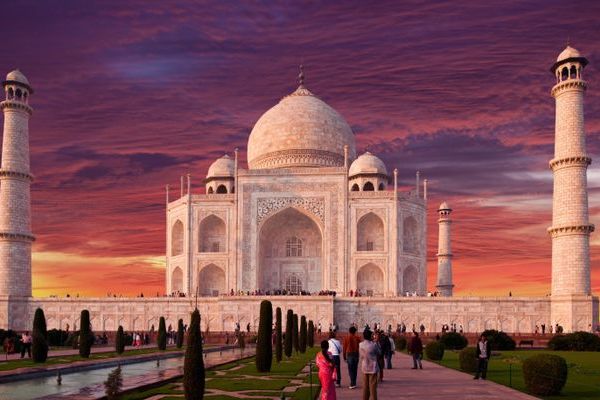
Taj Mahal
The Taj Mahal is one of the most famous buildings in the world, the mausoleum of Shah Jahan’s favourite wife, Mumtaz Mahal. It is one of the New Seven Wonders of the world, and one of the three World Heritage Sites in Agra. Agra is commonly identified as the “City of Taj”. Finished in marble, it is perhaps India’s most beautiful monument and is set amidst landscaped gardens. Built by the Persian architect, Ustad ‘Isa, the Taj Mahal is on the south bank of the Yamuna River.
Agra Fort
Agra Fort or Red Fort, was commissioned by the conquering Mughal Emperor Akbar the Great in 1565, and is another of Agra’s World Heritage Sites. A stone tablet at the gate of the Fort states that it had been built before 1000 but was later renovated by Akbar. The red sandstone fort was converted into a palace during Shāh Jahān’s time, and reworked extensively with marble and pietra dura inlay. Notable buildings in the fort include the Pearl Mosque or Moti Masjid, the Diwan-e-‘Am and Diwan-e-Khas, Jahangir’s Palace, Khas Mahal, Shish Mahal, and the Musamman Burj.
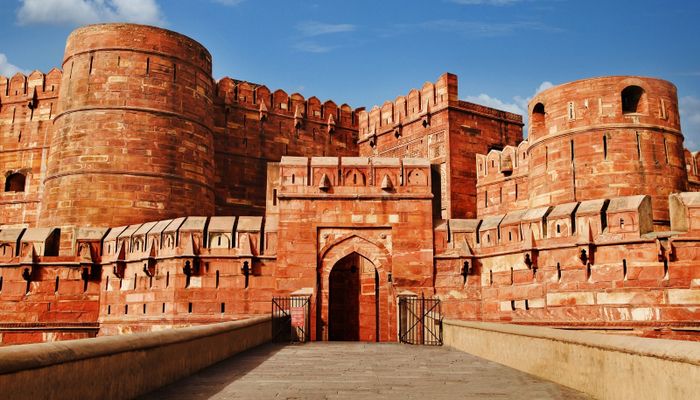
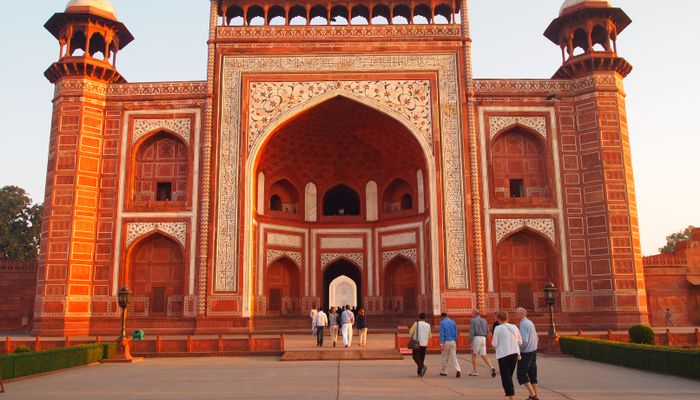
Fatehpur Sikri
The Mughal Emperor Akbar built Fatehpur Sikri about 35 km from Agra, and moved his capital there. Later abandoned, the site displays a number of buildings of significant historical importance. A World Heritage Site, it is often visited by tourists. The name of the place came about after the Mughal Emperor Babar defeated Raṇa Sanga in a battle at a place called Sikri. Then the Mughal Emperor Akbar wanted to make Fatehpur Sikri his headquarters, so he built a majestic fort; due to shortage of water, however, he had to ultimately move his headquarters to Agra Fort.
I’timad-Ud-Daulah
The Empress Nur Jahan built I’timad-Ud-Daulah’s Tomb, sometimes called the “Baby Taj”, for her father, Mirza Ghiyas Beg, the Chief Minister of the Emperor Jahangir. Located on the left bank of the Yamuna river, the mausoleum is set in a large cruciform garden, criss-crossed by water courses and walkways. Its garden layout and use of white marble, pietra dura, inlay designs and latticework presage many elements of the Taj Mahal.
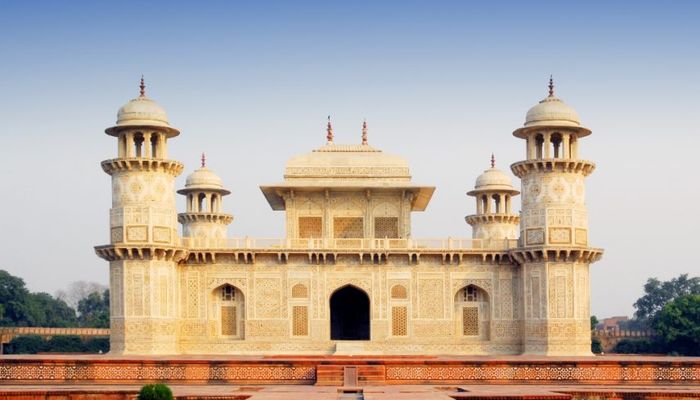
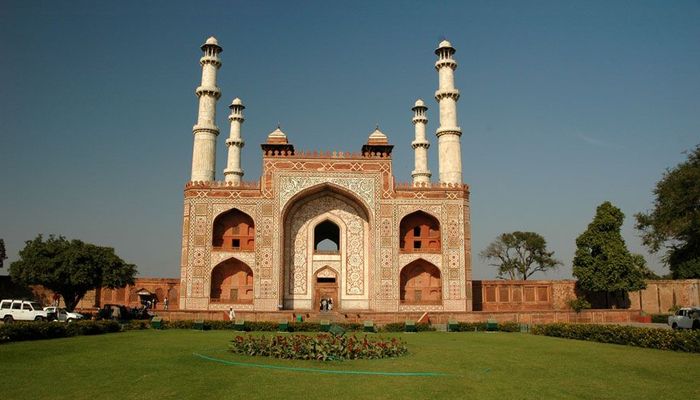
Sikandra
Sikandra, the last resting place of the Mughal Emperor Akbar the Great, is on the Delhi-Agra Highway, only 13 kilometres from the Agra Fort. Akbar’s tomb reflects the completeness of his personality. The vast, beautifully carved, red-ochre sandstone tomb with deers, rabbits and langurs is set amidst a lush garden. Akbar himself planned his own tomb and selected a suitable site for it. To construct a tomb in one’s lifetime was a Turkic custom which the Mughals followed religiously.
Jama Masjid
The Jāma Masjid is a large mosque attributed to Shah Jahan’s daughter, Princess Jahanara Begum, built in 1648, notable for its unusual dome and absence of minarets.
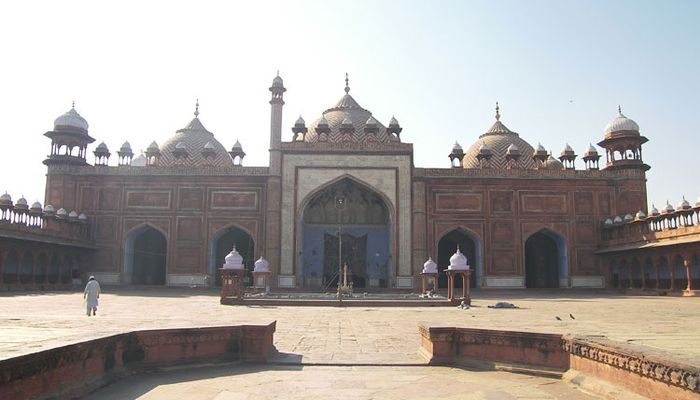
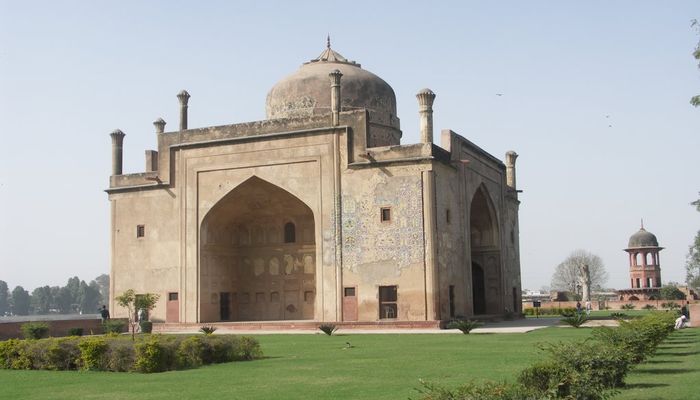
Chini ka Rauza
Notable for its Persian influenced dome of blue glazed tiles, the Chini ka Rauza is dedicated to the Prime Minister of Shah Jahan, ‘Allama Afzal Khal Mulla Shukrullah of Shiraz.
Other Attraction
Roman Catholic Cemetery, Chhatri of Raja Jaswant Singh, Soor Sarovar, Dayal Bagh, Chausat Khamba, Mariam’s Tomb, Guru ka Taal, Mankameshwar Temple
